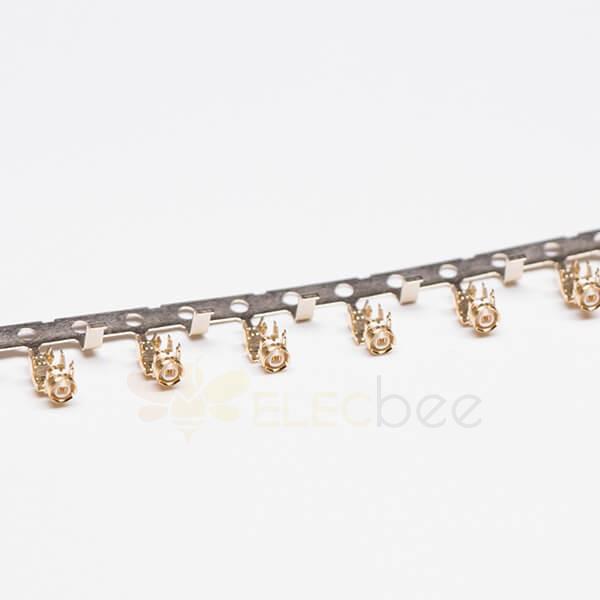エレクトロニクスの世界では、コネクタはさまざまなコンポーネント間でデータと電力をシームレスに転送する上で重要な役割を果たします。 市場で入手可能な膨大な数のコネクタの中で、IPEXコネクタコンパクトなデザインと高周波性能により大きな人気を集めています。 この記事では、IPEX コネクタの基礎、そのアプリケーション、およびそれらが提供する利点について詳しく説明します。
IPEX コネクタについて
IPEXコネクタは小型です。RFコネクタ無線通信システムで使用されます。 極細同軸コネクタ、IPX コネクタ、MHF コネクタ、または u.fl コネクタとも呼ばれます。 IPEX コネクタは、アンテナやその他の RF コンポーネントを回路基板に接続するための薄型、省スペースのソリューションを提供するように設計されています。 日本の企業である I-PEX によって開発されたこれらのコネクタは、薄型で軽量な設計が特徴です。
IPEX コネクタは通常、オス プラグとメス ソケットで構成され、さまざまな用途に安全で信頼性の高い接続を提供します。 フレキシブルケーブルで接続されています。 プラグは回路基板にはんだ付けされ、レセプタクルは外部アンテナまたは他の RF コンポーネントに接続するために使用されます。
IPEX コネクタは、一般的な高さ約 1.2 mm、幅 2 mm の小型サイズが特徴です。 また軽量なので、小型機器での使用に最適です。

IPEXコネクタの主な特徴
コンパクトなデザイン
IPEX コネクタの最も注目すべき機能の 1 つは、その小型フォーム ファクターです。 一般的な嵌合高さは 2.5 mm 以下で、これらのコネクタはスペースに制約のある用途に最適です。 コンパクトな設計により、メーカーはプリント基板 (PCB) 上の貴重なスペースを節約でき、よりスリムで合理化されたデバイスを開発できるようになります。
優れた高周波性能
IPEX コネクタは、通常最大 6 GHz の高周波信号を処理できるように設計されています。 この広い周波数範囲により、Wi-Fi や GPS から携帯電話や Bluetooth 接続まで、さまざまなアプリケーションに適しています。 コネクタの低い挿入損失と優れたインピーダンスマッチングにより、最適な信号伝送が保証され、信号劣化や干渉のリスクが軽減されます。
簡単な組み立てと分解
IPEX コネクタは、組み立てと分解が簡単にできるように設計されており、頻繁に接続と取り外しが必要な用途に最適です。 オスのプラグは、簡単な押し込み操作でメスのソケットにカチッとはまり、工具を必要とせずにしっかりと接続されます。 コネクタを外すには、単純に引っ張る力をプラグに加えてソケットから外します。
耐久性と信頼性
IPEX コネクタは耐久性と信頼性が高いことで知られており、通常の機械的ライフ サイクルは 30 回を超える嵌合サイクルです。 コネクタの金メッキ接点は優れた耐食性と低い接触抵抗を保証し、長期にわたる性能に貢献します。
IPEXコネクタの用途
IPEX コネクタはその汎用性の高さにより、幅広い業界やデバイスに応用されています。 最も一般的なアプリケーションには次のようなものがあります。
無線通信装置
IPEX コネクタは、スマートフォン、タブレット、ラップトップ、アクセス ポイントなどの無線通信デバイスで広く使用されています。 アンテナに信頼性の高い接続を提供し、Wi-Fi、GPS、セルラー通信用の高周波信号の送信を可能にします。
モノのインターネット (IoT) デバイス
モノのインターネット (IoT) は急速に成長している分野であり、ワイヤレス接続を備えたデバイスの数が増加しています。 IPEX コネクタは、コンパクトな設計と高周波性能により、IoT デバイスにとって理想的なソリューションであり、デバイスとネットワーク間の信頼性の高い通信を保証します。
無線周波数識別 (RFID)
IPEX コネクタは、RFID (Radio Frequency Identification) システムで一般的に使用され、RFID リーダーとアンテナ間の高周波信号の送信を可能にします。 優れた性能とコンパクトな設計により、この用途で人気の選択肢となっています。
ドローンと無人航空機 (UAV)
ドローンや UAV は、多くの場合、飛行性能と効率を最大化するために、コンパクトで軽量なコンポーネントを必要とします。 IPEX コネクタは、これらのデバイスのアンテナやその他の RF コンポーネントを接続するための省スペース ソリューションを提供し、信頼性の高い通信とナビゲーションを保証します。
IPEX コネクタの設計
IPEX コネクタは、アンテナやその他の RF コンポーネントを回路基板に接続するための薄型、省スペースのソリューションを提供するように設計されています。 プラグとレセプタクルで構成されており、それらはフレキシブルケーブルで接続されています。 プラグは回路基板にはんだ付けされ、レセプタクルは外部アンテナまたは他の RF コンポーネントに接続するために使用されます。
IPEX プラグは通常、真鍮またはリン青銅で作られていますが、レセプタクルは PTFE などの誘電体材料で作られています。 プラグとレセプタクルとを接続するフレキシブルケーブルは、通常、細径同軸ケーブルや極細同軸ケーブルで構成される。
IPEX コネクタは、特定の周波数範囲 (通常は 0 ~ 6 GHz) で動作するように設計されています。 特性インピーダンスは 50 オームで、これは RF システムで使用される標準インピーダンスです。
IPEXコネクタの制限事項
IPEX コネクタには多くの利点がありますが、いくつかの制限もあります。 主な制限の 1 つは、電力処理能力です。 IPEX コネクタは、電力処理能力が限られているため、高電力用途向けに設計されていません。 これは、通常、低電力デバイスで使用されることを意味します。
IPEX コネクタのもう 1 つの制限は、その耐久性です。 IPEX コネクタは、サイズが小さく繊細な設計のため、取り扱いや使用中に損傷しやすい場合があります。 これにより、信号が損失したり、コネクタが完全に故障したりする可能性があります。
さらに、IPEX コネクタは、繰り返し使用するとコネクタに磨耗が生じる可能性があるため、頻繁に接続と取り外しが必要な用途には適していません。
IPEX コネクタを使用する利点
IPEX コネクタは従来の RF コネクタに比べて多くの利点を備えているため、さまざまな用途で人気の選択肢となっています。 主な利点には次のようなものがあります。
- 省スペース設計: IPEX コネクタのコンパクトな性質により、メーカーは PCB 上の貴重なスペースを節約でき、よりスリムで合理化されたデバイスの開発が可能になります。
- 高周波性能: IPEX コネクタは高周波信号を処理できるように設計されており、最適な信号伝送を保証し、信号劣化や干渉のリスクを軽減します。
- 組み立てと分解が簡単: IPEX コネクタのシンプルな押し込みと引き抜き動作により、工具を必要とせずに迅速かつ簡単に組み立てと分解が可能です。
- 耐久性と信頼性: IPEX コネクタは、嵌合サイクルが 30 回を超える一般的な機械的ライフ サイクルと金メッキ接点を備えており、長期にわたる性能と信頼性の高い接続を提供します。
結論として、IPEX コネクタは、そのコンパクトな設計、高周波性能、使いやすさのおかげで、さまざまな用途で人気のある選択肢として浮上しています。 これらのコネクタの基本を理解することで、特定のニーズやアプリケーションに適したコネクタを選択する際に、情報に基づいた意思決定を行うことができます。






